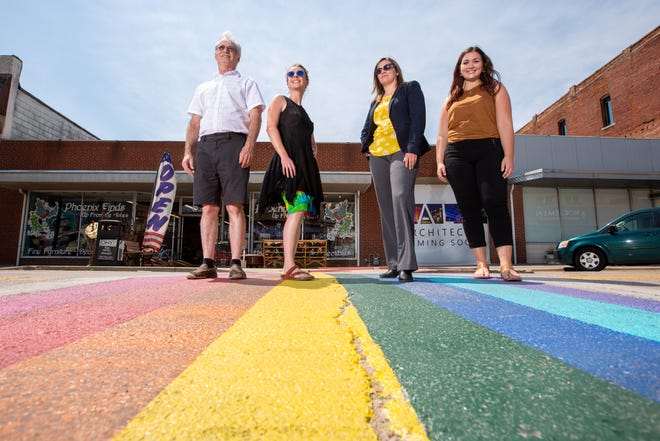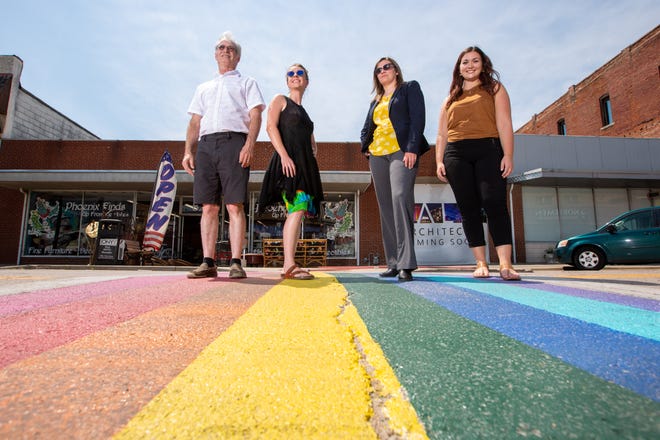
For small-business owner Shelby Herring, it is important to create an environment that is open and welcoming to all.
Herring is co-owner of The Eleven Hundred, a wedding and event venue in East Topeka. She is also a member of the LGBTQ community and knows other venues don’t always offer the same safe space.
“We know there are businesses that don’t support the community,” Herring said. “I know that as a member of the LGBTQ community, and being a wedding-venue owner, how important it is to make sure that everybody’s included and accepted.”
In light of June being Pride Month, The Topeka Capital-Journal is shining a light on some Topeka-area businesses that are LGBTQ owned. And Herring is one of a few local business owners who agreed to share their stories.
More:GTP announces ‘Inclusive Topeka’ effort, urging businesses to support marginalized groups
Those interviewed said their identities shape their business practices in some ways, and their presence as entrepreneurs increases LGBTQ representation within Topeka’s small-business community.
Such representation is a big deal, said local attorney Nicole Revenaugh, who has been openly gay since she was a teenager and is now a partner at Irigonegaray, Turney & Revenaugh LLP.
“If we speak at a school or go to an alumni function, and we interact with other young people who are either questioning their identity or have arrived at an identity that falls within LGBT, instead of limiting what they think their options are, they see us and they see that we can become the same professionals that every other person can become,” Revenaugh said. “I feel like I’ve been the recipient of that inspiration.
“When I was younger and saw a gay lawyer speak about something, it was fascinating, and it was the opposite of limiting.”
What’s Pride, and why is it important?
According to the Library of Congress, Pride Month commemorates “the impact that lesbian, gay, bisexual and transgender individuals have had on history locally, nationally and internationally.”
Pride is a more than 50-year-old tradition that arose after the 1969 Stonewall Uprising, in which a police raid of a gay bar in New York City led to days-long civil unrest outside the Stonewall Inn in Manhattan’s Greenwich Village. The uprising is considered a turning point in the struggle for LGBTQ civil rights, and the inn has since been named a National Historic Landmark.
According to Out Leadership‘s State LGBTQ+ Business Climate Index for 2021, Kansas ranked 24th out of 50 for its commitment to providing a safe and inclusive environment for LGBTQ individuals. That ranking represents a notable improvement, as Kansas jumped nine slots between 2020 and 2021.
Though celebrating Pride and its related diversity has become more prevalent among members of the general public over the years, many in the LGBTQ community may still feel wary sharing details publicly about their identities.
For Herring, that hesitation sometimes manifests itself in her interactions with potential customers.
“Sometimes it’s kind of scary,” Herring said, “because you don’t know what kinds of couples are coming into your venue and who you’re going to have. And a lot of times they want to ask you about your own relationship, and you have to make that call — is this a safe space to talk about my own girlfriend and our life?”
Wife-and-wife duo Chelsea and Jacques Smith, who co-own Studio 62 in Topeka’s NOTO Arts & Entertainment District, said they have felt similar hesitation when considering whether to display a rainbow-colored Pride flag outside their business.
“For the most part, I feel really comfortable here in NOTO,” Chelsea said. “But for a while, I was a little afraid to put our Pride flag out. That was a feeling even before, when we had a business (in Barrington Village).”
That feeling has subsided some, she said, and they proudly display the flag when they host Studio 62 events, such as drag shows.
“Now, we just put it up there,” Chelsea said. “We’re here.”
Business owners look to create judgment-free zones
Though anyone is welcome at the art bar, many of Studio 62’s events are geared toward members of the LGBTQ community, the Smiths said.
“We did a Pride painting for two days,” Chelsea said, of an event Studio 62 held recently. “They could come in and make really cool rainbow paintings in different designs.”
They also hold such events as drag shows, open-mic nights, trivia nights, wine tastings and murder-mystery parties.
Ultimately, the goal is to create a welcoming community space where everyone — whether they come for the art or the bar — feels free from judgment or harm.
“We have all kinds of people come in here,” Chelsea said. “I want this to be a safe place for everybody, that’s just fun and comforting.”
Ken Liddle, co-owner of The Enchanted Willow, at 2209 S.W. Gage Blvd., takes a similar approach to business.

Liddle, who is bisexual, became part owner of The Enchanted Willow in 2013, after moving to Topeka. And he quickly helped the store improve its operations.
Prior to moving to Topeka, Liddle served in the Air Force; worked for Walmart, where he was hand-picked for a business training course; and later earned a degree in accounting and business management.
He put all of that experience to use at The Enchanted Willow, which offers natural healing supplies, herbal remedies, crystals and more.
“I looked at how they were doing business,” Liddle said, “and they were following the typical metaphysical-supply-store pricing, business strategy of you buy from the wholesaler, the wholesaler gives you a suggested retail price, you mark the product at that price or slightly above.”
But Liddle knew that wasn’t sustainable.
More:Topeka City Council bans discrimination against LGBTQ persons
“I looked at the Topeka demographic,” he said. “I looked at expendable income in Topeka, because that’s all we get; it’s basically people’s expendable income. And I applied some of what I had been taught in college.”
Now, when he buys in bulk, he passes those savings on to his customers. And that practice has turned The Enchanted Willow’s profits around.
“We opened the doors in June 2015 at this location,” Liddle said. “We ended 2015 in the red. We ended 2016 in the red; 2017, we were in the black; 2018, we were in the black. … It’s been growing steadily.”
Aside from the store’s business model, though, there is another philosophy that guides Liddle and The Enchanted Willow. He said a goal of the store is to make people’s lives more whole — and that includes everybody.
Liddle, who practices the modern Pagan religion of Wicca, said a guiding principle of the religion is that “all acts of love and pleasure are sacred.”
“There’s no gender to that statement,” he said. “The statement says that all acts of love and pleasure are sacred. An act of love can be as simple as seeing a stranger walking down the street on a hot day like today, me having a bottle of ice water in the refrigerator and me taking it out and saying, ‘Hey, you look like you could use this.’ That can be an act of love.”
And that perspective guides his business practice, too.
Revenaugh, of Irigonegaray, Turney & Revenaugh, said her identity — and that of fellow law partner Bo Turney — shapes somewhat how their firm does business.

“We may be the only majority LGBT-owned law firm in the state,” Revenaugh said. “From our perspective, it creates this really unique opportunity. It’s helped us connect with members of the community, prospective clients.”
She said some people seek the firm out because of its diversity, as clients may feel more comfortable talking to lawyers who empathize with their situations.
“Not only do we have the legal expertise to help you with your issue,” Revenaugh said, “but some of us have actually personally dealt with the same problem or issue or challenge. That’s the uniqueness we can bring as LGBT attorneys.”
Revenaugh indicated there is a disarmament that takes place when a client, or customer, feels safe in a certain business setting — and providing that feeling of security isn’t unique to the law.
“We can skip the part,” Revenaugh said, “where they, as a member of the gay community, have to wonder can I tell my lawyer this? Can I tell this person this? Or is that uncomfortable? Or will they not want to serve me?
“Because nobody wants to be rejected.”

